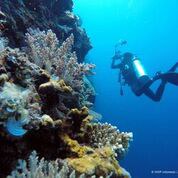Bringing the 4th Industrial Revolution to Ocean Conservation
April 29, 2019
In a new paper, Disrupting Data Sharing for a Healthier Ocean, published this week in the ICES Journal of Marine Science, marine conservation scientists and IBM data professionals reveal new ways that technology and social networking could disrupt ocean data sharing to transform how we manage the ocean.
“You wouldn’t manage a business without having real-time information about your inventory, but that is exactly how we are trying to manage much of our ocean” says Dr. Linwood Pendleton, Global Lead for Ocean Science at WWF and lead author of the study. “The vast majority of ocean data remains locked away in notebooks, on laptops, and buried on websites. Ocean and coastal managers can’t use data that they can’t find.”
Fortunately, advances in data sharing, management, and even social marketing, already widely used in business, finance, and even health care, could unlock these treasure troves of ocean data.
For the entire month of August 2018, seven IBM data professionals joined ocean conservation scientists from WWF, the University of Queensland, and the Australian Institute of Marine Science for an intense month-long brainstorming workshop to identify ways to unlock, organise, and make accessible the ocean data conservationists and managers need to ensure that ocean ecosystems survive a future in which climate change and economic growth imperil ecosystems worldwide. While the initial focus of the team was coral reef conservation, it became obvious that the challenges and solutions that faced coral reef managers applied across ocean ecosystems.
Leading Australian marine scientist Dr Lyndon Llewellyn of the Australian Institute of Marine Science said the Great Barrier Reef was one of the best studied ecosystems in the world. “Managing all of the data these studies have produced is mind boggling and the flow of data is only getting bigger, faster and more diverse as even more scientists, organisations and citizens join the effort to understand and protect it,” Dr Llewellyn said.
Recent advances in data collection technology mean that we have more ocean data than ever. But getting it into the cloud and then finding it remains a challenge.
“Getting data out of the realm of science and into the hands of ocean professionals isn’t all that different than getting products from artisans to consumers,” according to Guillermo Olmedo, a Latin American Senior Manager from IBM-Argentina.
“By using advanced data collection and sharing methodologies, the ocean science community could usher in a new paradigm of global collaboration. Technology can also help people get their data into the virtual marketplace of ideas,” adds Rahul Jain, a consultant from IBM-India.
The paper includes proposals for data impact factors, web-interfaces that use artificial intelligence to automate data uploading, and even the creation of a “combinatorial machine” that would provide a one- stop shop, and social network, for data producers and users.
“Unlocking data, first means getting people to share their data and that requires a cultural shift. Creating ecosystems that will give credit and recognition to scientists who share data is one way to encourage that,” notes Lynette Seow, a consultant from IBM-Singapore.
Prof. Ove Hoegh-Guldberg, one of the paper’s co-authors reflects on the findings. “It is our hope that this paper provides a roadmap for new ways to transform how we use science to manage our ocean. The United Nations has declared the next 10 years as the Decade of Ocean Science for Sustainable Development and this is our initial contribution to that grand endeavor.”

